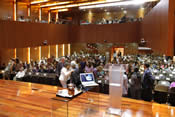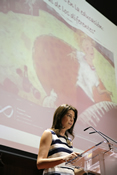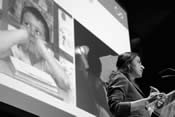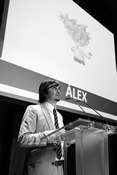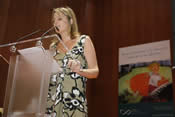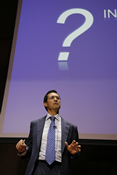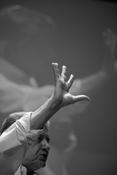News: Various
I Conference - Elisabeth d'Ornano Association: "New prospects in education: the potential of those who are different"
Date: July 2010 / Category: Various
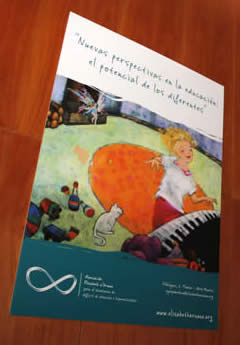
On Tuesday, 1 June 2010, at the Fundación Albéniz Auditorium, the Elisabeth d’Ornano Association for Attention Deficit-Hyperactivity Disorder organised its first Conference.
On this occasion, the Session catered to educators in a broad sense, parents, teachers, people in charge of educational institutions, etc. The context of the Session was the new Society in which we live, in an environment of permanent change and uncertainty. At the Association we think that for parents and other educators it is a challenge to help children reach the level of preparation and personal development required to become adults adapted to Society and able to realise their potential. For children who have some kind of difficulty, or whose development and capacities are different than those of the majority, it is especially difficult to go through education successfully.
The thread of the Session was the analysis of different perspectives of education and the various solutions for drawing the maximum potential from those whose personal development is limited because of different reasons, and we especially wish to convey a message of hope, optimistic but at the same time realistic, in the sense that children who are different may develop in a very satisfactory manner and become balanced and fully realised individuals. As educators we consider that flexible education is crucial if we are to enable these children to go through school successfully. To do this we must help them find and develop the areas in which they stand out and develop better. Many children would benefit from a more creative education and those suffering ADHD are particularly good in various areas such as sports, music, art, film… and even politics and social relations. The lack of support from their surroundings would have deprived us of wonderful characters who we value highly and sometimes worship, such as Mozart. In a world in which it is a major goal to provide equal opportunities for all, we understand that education should become one of the most flexible rights and one that can be adapted to diversity.
Dr. Mara Parellada started the Session by presenting the Councillor of Education of the Community of Madrid, Ms Lucía Figar de Lacalle, who officially inaugurated the Session. The Councillor’s interest in supporting children with difficulties is a known fact to us and therefore we thank her for participating. She described the actions carried out by the Department of Education to assist in educating in diversity, strongly supporting a varied and individualised education to include all children within the objectives of state education. She explicitly stated her support for initiatives such as our Association, and specifically for the dissemination and training activities carried out at the Association. She undertook to disseminate the Association’s Guides for Teachers, in order to try to get all schools to be informed of the basic principles for helping hyperactive children.
Next the four speeches that were programmed took place.
The first speech was by Mara Parellada, a Doctor in Medicine from the Autonomous University of Madrid specialising in Children and Youth Psychiatry at the Institute of Psychiatry and Maudsley Hospital of King´s College in London and an Associate Professor of the Department of Psychiatry at the Complutense University in Madrid. Her speech, titled “Reconocimiento y diagnóstico del TDAH en la vida cotidiana” (Recognition and diagnosis of ADHD in everyday life) was dedicated to general aspects of ADHD, also considering the more technical aspects of handling ADHD and the importance of the global education of a person in all fields. Aspects such as motivation, support, affection or confidence were pointed out as prior and essential elements in order for any educational or therapeutic initiatives to be effective. Among the things she mentioned about ADHD, she explained why it is considered a disorder and the advantages and dangers of establishing a diagnosis. She spoke about the difference between labelling a person and attaching a stigma and, on the other hand, identifying difficulties, diagnosing personal characteristics and problems, in order to be able to individualise the way that person is taught and educated. She provided a summary on what we know about its origin and the extent to which biological and environmental factors have an influence. She also pointed out a few key features for detection in the regular environment where a child develops (at home and at school), in order not to delay the identification of difficulties requiring special attention. Next she discussed the general principles for helping these children to grow and develop happily and competently in spite of their difficulties; how aspects such as the acceptance of differences among children and permanent self-criticism in respect of our own concepts of education can be helpful. She mentioned how our expectations on the future of our children and on our role in their education, and the need for help from others, must be revised continually.
Miguel Moreno, a Doctor in Medicine and Specialist in Child and Teenager Psychology at Columbia University in New York, read out the speech titled “Vida cotidiana de hiperactivos, impulsivos e inatentos” (The everyday life of hyperactive, impulsive and inattentive persons). By means of an optimistic, tender and futuristic story he conveyed a message for those living with someone diagnosed with Attention Deficit-Hyperactivity Disorder (ADHD). Using situations from everyday life as examples, he provided a subtle and elegant account of the difficulties hyperactive children face in their everyday life. He spoke —by reviewing situations such as waking them up, having breakfast, making it to school on time, making sure they take everything they need to school, seeing to it that they are on time, that they eat all their food, do their homework and go to bed at a reasonable time— of the efforts required from parents and educators to accompany these children throughout their development. We were all able to feel empathy and even sympathy for parents exercising the difficult and tiring task of educating these children. The main character of the story was Alex, a 13-year old boy diagnosed with ADHD. Alex is lucky to have a wonderful family whose members understand and accept his way of being and behaving, who try to help him improve every day, who have the appropriate means to take care of him and sufficient patience to understand him and love him dearly. And Alex also goes to the ideal school, a place where teachers are aware of his difficulties and try to lead him towards areas where he can stand out by means of a balanced education. With this fictional case, he illustrated an ‘ideal’ example that can serve as a reference for those who sometimes feel at a loss in their relation with boys and girls who have these features.
Next there was a break with refreshments prior to going on to the second part of the Session, which continued with a speech by the President of the Association. Elisabeth d´Ornano explained, in a clear and warm manner, her motivations and the goals sought when creating the Association, and how it has progressed in its first year. She mentioned the aspects which she considers most important in education, her view of a comprehensive, global education, and the importance, for the development of children and for the life of people, of nurturing aspects such as their relationship with Nature, with Art and, particularly, the search for the innate talents of every person. She also pointed out the importance of being able to see in every child its own destiny, skills and virtues, without trying to impose the path desired or devised by its parents. The President of the Association then gave the audience a short, wonderful concert, performed by prominent students from the Reina Sofía Superior School of Music, located at the venue.
The third speech was given by Dr. Mario Alonso Puig. He has been a General Surgeon and a Digestive Surgeon for over 25 years. He was a Fellow in Medicine and Surgery at Harvard University, he took a Master’s Course in Hospital Management (IESE), he holds an International Diploma of Superior Studies in Medical Sofrology and he also received the Award of Merit in Communication and Human Relations given by the Dale Carnegie Institute in New York. He is a member of the New York Academy of Sciences and of the American Association for the Advancement of Science. He worked for two years at the Institute of Neurological Sciences in Madrid and he has dedicated a substantial part of his life to studying the Upper Brain Functions. Dr. Mario Alonso Puig is one of the most highly demanded experts among corporations and public administration bodies to give speeches and seminars on leadership, creativity, business innovation and managing change. He has written books with titles such as “Vivir es un asunto urgente” (Living is an Urgent Matter), “Madera de líder” (The Stuff of Leaders), or his latest book, “Reinventarse: tu segunda oportunidad” (Reinventing Yourself: Your second chance).
His speech titled “La experiencia emocional de enseñar y aprender: un abordaje neurobiológico” (The emotional experience of teaching and learning: a neurobiological approach) was based on the premise that learning is essential in all growth and personal evolution processes and it is an exceptionally complex and sophisticated process that integrates multiple areas of our brain and produces changes even at the physical level. He explained in a simple though technically correct manner some of the neurobiological aspects involved in learning. He explained how the pre-frontal lobes of the human brain are the parts leading us in helping us to discover, understand and remember. These powerful structures, however, have an extraordinary connection with the limbic system, our emotional brain, and they cannot operate properly if there are emotional factors preventing them from doing so. Traditional teaching systems pay a great deal of attention to the intellectual factor in learning and very little to the emotional factors. This is surprising if we consider that an emotionally blocked person is intellectually nullified. In his speech he explained in an entertaining, dynamic and humorous manner the close relationship between reason and emotion and how to integrate them to improve our learning capacity. He also explained some findings that have surfaced in recent years in the study of learning, for instance: 1. There is not just one intelligence, there are multiple ones. 2. Intelligence is something that can be expanded or shrunk as if it were of a plastic nature. 3. The neurones in the hypofield, which are basic for learning and remembering, can be regenerated and even increase in number starting from stem cells located in the brain cavities. 4. Changes in a person’s mood affect the blood flow towards their brain. All of these discoveries have an extraordinary practical application in the classroom, and they invite us to delve into the learning process with a spirit of curiosity and fascination. Only when we believe that every human being harbours an extraordinary potential will we advance enthusiastically in the wonderful adventure of helping that potential to surface and take off.
He also mentioned that the learning process, however arduous, can be wonderful, using as an example a quote from Hellen Keller, the girl who despite being blind, deaf and dumb graduated with honours from Harvard University: “Life is either a daring adventure or nothing.”
The session was closed by Jorge Carvajal. Born in Medellin, Colombia, he earned his Doctor’s Degree at the University of Antioquia. For over more than 20 years he has dedicated his clinical practice to researching and teaching bio-energetic medicine as a model of integration of traditional forms of medicine and western medicine. Besides teaching doctors in over ten countries, he gives seminars, speeches, interviews and writes books portraying healthcare as the art of living. Dr Carvajal has the virtue of integrating traditional and modern medicine and of working on the aspects which, besides medicine, have an influence on the human being, on its health and on its ability to be in the world in a balanced way. He has written books such as “El arte de ser uno mismo” (The Art of Being Oneself) or “Amor, vida y medicina” (Love, Life and Medicine).
His speech titled “Alternativas TDAH: plasticidad cerebral y perspectivas no farmacológicas” (ADHD Alternatives: Cerebral plasticity and non-pharmacological perspectives) was dedicated to explaining how biology is integrated with other aspects of the human being, and how consciousness transcends each of these aspects and how what gives depth and meaning to the learning process is the relational context in which we live. If ADHD is the probable diagnosis, the prognosis implies, well beyond the biological factors, the human context of unconditional love, tenderness, patience, tolerance and resilience. He pointed out that as parents and educators we can adopt two possible strategies: 1. That of a constant and sterile struggle to impose rules, which encapsulates the potential of our children and students in the straitjacket provided by impersonal and massified education; 2. That of un-learning the old conditionings that did not bear a humanised fruit, in order to learn with children in the wonderful adventure of diversity, which is ultimately the most beautiful expression of any possible unity. This second way requires that we reconsider strategies so that, as a big family, parents, grandparents, doctors, psychologists and educators may creatively contribute personalised solutions. The way in which our genes express themselves, our dopamine and serotonin levels, our attention, memory and learning processes are all influenced by the way we live and relate. He spoke about love and learning. Love, he said, is like oxygen for neurones right from the start of the gestation process. Genuine love, which is as patient as it is demanding, which is as tolerant as it is orderly, which is as humble as it is assertive, is undoubtedly a powerful drug because of the organising action it exerts on the subtle chemistry of the brain. He even spoke of the neurochemistry of love and how it will probably become an objective for future research.
The Conference ended at half past eight, after an intensive, emotional afternoon that was meant to be full of knowledge, hope, empathy and optimism. We have the goal of continuing to organise events to help people to help children and thus to contribute to improving their future. We will see you next year.
